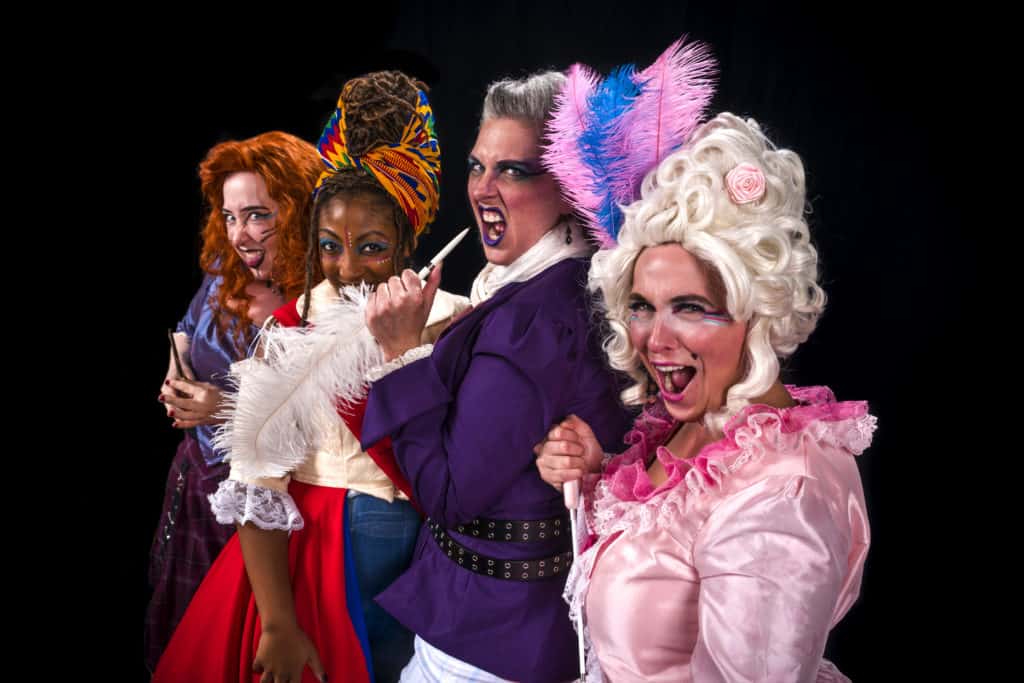The Playgoer: Colonial Players’ The Revolutionists

A Play Within a Play, a Revolution Within a Revolution
By Jim Reiter
Colonial Players has opened its 73rd season with Lauren Gunderson’s The Revolutionists, an imagined coming together of four women in the late 18th century who flex their feminist muscles as they fight for individual and common causes during the French Revolution’s Reign of Terror.
While Gunderson’s script skips along the surface of the important issues of the time, its contemporary language and attitude remind us that some of those issues, most notably the fight for equality, remain today. The play is now the subject of a dynamic, funny and often moving production that opened last week at Colonial Players.
A quartet of talented actors brings the revolutionary women to life. Mary C. Rogers is Olympe De Gouges, the author of the Declaration of the Rights of Women and of the Female Citizen; in the play, she is desperately trying to write a play but has writer’s block (“No one wants a musical about the French revolution”). Carey Bibb is Charlotte Corday, the boisterous murderer of journalist and politician Jean-Paul Marat, who wants a juicy line she can use at her beheading. Ryan Gunning Harris is Marie Antoinette, the last French queen, whose hilarious vapidity transitions to sisterly caring. Samantha McEwen Deininger is Marianne Angelle, a composite character who represents free Black women in Saint-Domingue (now Haiti) fighting French rule; she wants De Gouges to write a pamphlet supporting her cause.
In a play like this chemistry is critical, and under the direction of Jennifer Cooper, these four work together nicely even as they maintain clearly defined individual characters. Rogers is excellent as de Gouges, balancing the author’s struggle to encapsulate the Revolution at the same time as she seeks to propel egalite. Equally effective is Bibb’s Corday, loud and animated and determined to commit justice. Marie Antoinette could easily have become a comedic caricature, but Harris gives her character a perceptible depth from which the asides spring. Deininger makes the audience feel Angelle’s passion for her cause, and her personal tie to it.
While Cooper and her actors keep a lively pace, the first act seems to drag to its end, just as the second act takes a few minutes to kick into gear; both are products not of the performances but of Gunderson’s script. Cooper keeps most of the action at the center of Colonial’s rectangular stage, a necessity so the audience on all four sides can see. So it’s unfortunate that the play’s most impactful and clever special effects are projected onto a single screen set in a corner; typically this forces parts of the audience to crane their neck to look in that direction, if they aren’t blocked by other audience members; perhaps with sparser audiences due to COVID this won’t be a problem.
Costumes, hair, wigs and makeup nicely place the characters in the time period yet give them a unique, almost punk look, and while “less is more” is often the truism for lighting and sound, a full complement of effects featuring each is especially effective here.
But the real reason to see this production is the marvelous cast. All four are fully invested in their characters, thus bringing to life the anger, fear, and determination that can lead true believers to the ultimate sacrifice.
Runs through October 2; two hours and 20 minutes with one intermission; costumes by Amy Atha-Nicholls; lights by Shannon Benil, Ginny White; sound by David Cooper; set by Richard Atha-Nicholls; hair, wigs and makeup by Leigh Rawls. Tickets are $23 and $18; masks must be worn. Live streaming is available, though Colonial has taken many precautions for the live audience, including the installation of enhanced air filtration systems. For information visit www.thecolonialplayers.org.
